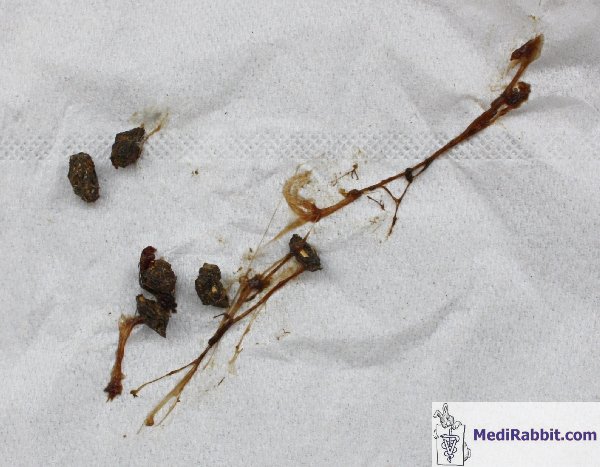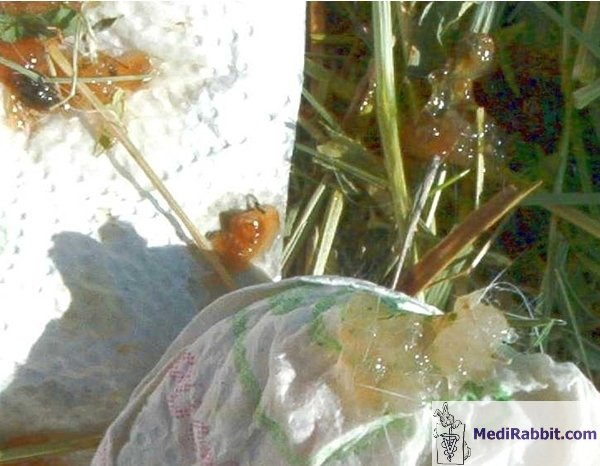Ok, so that would mean that your rabbit has some element of mucoid enteritis, though it sounds like it's very mild at this point which is a very good thing, and something you want to reverse asap before it has a chance to worsen as it can have very serious consequences once it progresses to diarrhea or severe mucoid jelly.
The clear substance or mucous/jelly, is caused by irritation to the digestive tract, often from pathogenic bacteria or from a food sensitivity. It can also happen after a rabbit has had GI stasis and the gut is returning to normal. The likely culprits of your rabbits digestive upset are going to be one of the veggies you're feeding or a sensitivity to one of the ingredients in the pellets. As long as your hay isn't spoiled(eg. noxious weeks or gone moldy- sour smell, white dust, black or white spots, dampness) then it's not going to be the likely cause of the upset. Though some rabbits can have a sensitivity to a particular hay, it's not common. To figure out what food is causing the problem, it's a matter of elimination. There's a slow method and a more rapid one to figure out what the offending food is. It's similar to what is recommended for a rabbit with mushy cecotropes or cecal dysbiosis, which is caused by an imbalance of the microflora in the rabbits cecum.
http://sawneeanimalclinic.com/downloads/chronic_intermittent_diarrhea_in_rabbits.pdf
http://rabbit.org/intermittent-soft-cecotropes-in-rabbits/
If you prefer to try the slower method, this would entail removing one or two food items at a time. Given the diet you are feeding, like suggested above, I would also first cut out the kale and the carrots. Being a cruciferous veggie, kale is the most likely one to be the cause of the upset. At least it's been my experience that cruciferous veg are common ones to cause upset. And like mentioned, carrots are high in carbs and very sugary, which is a common cause of digestive upset in rabbits. If you don't see improvement that week after removing those and it doesn't resolve the problem, then the celery would be the next thing I would remove. If that doesn't fix it then I would remove the rest of the veggies. If your bun is still having gas and mucoid jelly after removing all the veg, then last is the pellets. I had a rabbit that ended up having a pellet sensitivity. Once I removed them from his diet he was never sick again. If removing both veg and pellets, your bun is still having the problem and you've given it a week or two, the next to consider is the hay, either something is off with it or your rabbit is sensitive to that particular hay. If so then changing to a different hay like orchard, may be needed. You also need to consider your water source. I've read of instances where problems have been tracked back to contaminated water.
To try the quick method, it usually involves cutting everything out except hay. This only works if the bun involved doesn't rebel, and cooperates by eating a ton of hay to make up for the loss of the other food. Just free fed hay and water(I like to offer a salt lick as well as they normally get their sodium from their pellets) until the digestive system has had a chance to settle back to normal for a few days, then one by one other foods can start to be added back in. How long to let the digestive system settle and return to normal, depends on how bad the digestive upset has become. If it's not too bad, it can just take a few days til the gas is gone and there's been no mucous/jelly, and then things can be gradually added back in. If it's more severe, it can take several weeks to even months for the microflora in the rabbits digestive tract to get back into balance, but you should be seeing at least some improvement in the first week or two. If you aren't seeing any improvement after two weeks, then like above, consider the hay and water as the possible problem.
So when you start adding things back into the diet, you can start with the veggies or the pellets. I would probably start with the pellets, and you want to make sure to do this gradually, say starting with a tsp a day and increasing a tsp each day as long as the digestive upset symptoms don't return. If they do return with the pellets, the pellets may need to be cut out completely or feed a reduced amount, if the symptoms don't return with the reduced amount. If symptoms don't return with the pellets, once you get the pellets added back in ok, then you can start on the veggies, one at a time and starting with a small amount and gradually increasing the amount each day. After several days of having that veggie and everything being ok, add in another veggie. So doing it this way should show you which food was causing the problem, as when it gets added back into the diet, you will see the digestive upset symptoms return. Don't get in too much of a rush adding new things back in, as it can sometimes take a few days of having the offending food, for the problem to start to develop again.
If at any point you are concerned, or your buns symptoms worsen at all with lack of appetite, lethargy, increased mucoid jelly, diarrhea, etc, get your bun to your vet immediately as this can mean pathogenic bacteria is taking hold and it needs to be treated with the correct antibiotics immediately. If it were me, in a more advanced case of mucoid enteritis and/or with diarrhea, I would want to make sure the vet gave metronidazole, baytril, questran, and sub q or IV fluids. This would be to combat the pathogenic bacteria and the toxins they can cause. So this next link is the severe form of the disease and is more technical, but I'm including it to show the meds used to treat it just in case you find yourself in a position to need this info.
http://wildpro.twycrosszoo.org/S/00dis/Miscellaneous/Mucoid_EnteropathyRabbits.htm










































































